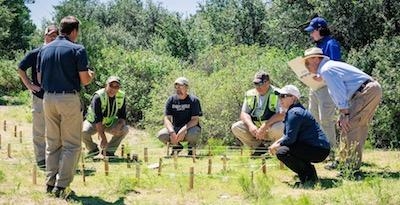Sat, Aug 26, 2017
Research Provided Data From Various Sensors That Can Be Beneficial To First Responders In Accident Situations
Representatives from Embry-Riddle’s Daytona Beach, Worldwide and Prescott campuses teamed up and were joined by members of the NTSB at the Prescott Campus’ Robertson Aircraft Accident Investigation Laboratory earlier this month to conduct field research in the first grant-funded project “Predictive UAS Emergency Management Sensor Detection Analysis and Application.”

Faculty members working on the research (which is funded by the University’s Research and Graduate Studies department led by Dr. Michael Hickey), include Prescott’s Dr. Erin Bowen and Assistant Professor Johnny Young, Worldwide’s Research Chair and Associate Professor Dr. David Ison and Assistant Professor Dr. Sonya McMullen and Daytona Beach’s Assistant Professor Dr. Troy Henderson and Assistant Professor Dr. Richard Prazenica. NTSB investigators Bill English and Michael Bauer were there to examine how to integrate unmanned vehicles into accident investigation. Both the NTSB and Embry-Riddle research teams have agreed to share imaging data collected during this week – which includes studying sensor packages (like infrared) and camera options to aerially scan for various chemicals, heat signatures, metallic or composite fragments and more.
“This research provided us data from various types of sensors that will likely be able to assist first responders and accident investigators. The applications potentially apply to all types of transportation,” said Dr. Ison, who is Principal Investigator on the project. “The NTSB has been very encouraged by our results, and we discovered some interesting applications of sensor data atypical to transportation and observations that we plan to leverage further in future research.”
Also present was Professor of Safety Science and Prescott Crash Lab director Bill Waldock, who was onsite working with a film crew from Discovery Channel Canada.
“Partnering for research across all three Embry-Riddle campuses has been, and continues to be, an outstanding experience. We are combining our respective skills and knowledge in ways even we didn’t anticipate,” said Dr. Bowen, Director of the Robertson Safety Institute and Chair of the Behavioral & Safety Sciences Department at the Prescott Campus. “I think it was this synergy in our collaboration that encouraged the NTSB to connect and come out to our facilities and share their work with us as well. I’m confident this team is going to be working on projects together for a long time.”
(Image provided with ERAU feature story)
More News
From 2023 (YouTube Edition): "Ain’t Your Daddy’s Super Cub”—Don Wade Co-owned by Don and Ron Wade—the former of Don’s Dream Machines, a storied >[...]
Pilot-Rated Passenger Reported That The Pilot Did Not Adequately “Round Out” The Landing Flare And The Airplane Bounced And Yawed To The Right Analysis: The pilot state>[...]
Dead Reckoning Dead reckoning, as applied to flying, is the navigation of an airplane solely by means of computations based on airspeed, course, heading, wind direction, and speed,>[...]
Aero Linx: Lake Amphibian Club This website is created and sponsored by the Lake Amphibian Club, to help spread the word about these wonderful, versatile amphibians that can land j>[...]
“I am deeply honored to be sworn in as NASA administrator. NASA’s mission is as imperative and urgent as ever — to push the boundaries of human exploration, ignit>[...]
 Classic Aero-TV: In Praise of Alabamas Patriot Aircraft USA
Classic Aero-TV: In Praise of Alabamas Patriot Aircraft USA NTSB Final Report: Cirrus Design Corp SR22
NTSB Final Report: Cirrus Design Corp SR22 ANN's Daily Aero-Term (12.21.25): Dead Reckoning
ANN's Daily Aero-Term (12.21.25): Dead Reckoning ANN's Daily Aero-Linx (12.21.25)
ANN's Daily Aero-Linx (12.21.25) Aero-News: Quote of the Day (12.21.25)
Aero-News: Quote of the Day (12.21.25)



